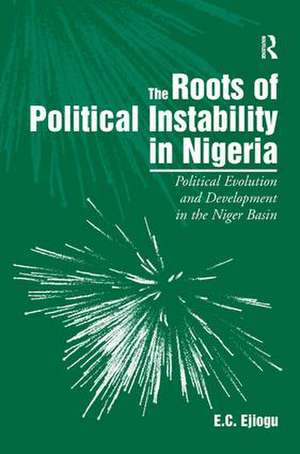The Roots of Political Instability in Nigeria: Political Evolution and Development in the Niger Basin
Autor E.C. Ejioguen Limba Engleză Hardback – 28 mar 2011
Preț: 822.91 lei
Preț vechi: 1104.53 lei
-25% Nou
Puncte Express: 1234
Preț estimativ în valută:
157.47€ • 164.82$ • 131.06£
157.47€ • 164.82$ • 131.06£
Carte tipărită la comandă
Livrare economică 31 martie-14 aprilie
Preluare comenzi: 021 569.72.76
Specificații
ISBN-13: 9780754679875
ISBN-10: 075467987X
Pagini: 250
Dimensiuni: 156 x 234 x 21 mm
Greutate: 0.62 kg
Ediția:1
Editura: Taylor & Francis
Colecția Routledge
Locul publicării:Oxford, United Kingdom
ISBN-10: 075467987X
Pagini: 250
Dimensiuni: 156 x 234 x 21 mm
Greutate: 0.62 kg
Ediția:1
Editura: Taylor & Francis
Colecția Routledge
Locul publicării:Oxford, United Kingdom
Notă biografică
E.C. Ejiogu, Assistant Research Professor, Center for Innovation, University of Maryland, College Park, USA
Recenzii
'This is a masterful new sociological and historical analysis of the roots of Nigeria's half-century of political conflict. A destabilizing lack of congruence among the authority patterns and practices of Nigeria's constituent ethnic groups extends from pre-colonial times to the present. This theoretically grounded interpretation is widely applicable elsewhere in post-colonial Africa.' Ted Robert Gurr, University of Maryland, USA 'The book is timely and insightful. It is timely given the political difficulties in Nigeria. Like South Africa, the solution of Nigeria's problems is key to the solution of Africa's problems.' Kwandiwe Kondlo, University of the Free State, South Africa '... political instability and democratic transition in modern Nigeria has been documented in several books and journal articles, but none of these has captured the nuances of Nigerian politics and society than the recently-published book by Professor E.C. Ejiogu... This brilliantly-written book is certainly a welcome addition to the growing body of work on the failed state in Nigeria... the author's arguments are laid out brilliantly in the introductory chapter of the book... Ejiogu deserves commendation for his bold, clear, and straight forward 'in your face' analysis throughout the 11 chapters of this book...' Journal of Asian and African Studies
Cuprins
Part 1 Issues, the Land, the Inhabitants and History; Chapter 1 Introduction: A Chronology of Continuing Instability; Chapter 2 Colonial Heritage and State Instability in Nigeria: A Theoretical Consideration; Chapter 3 The Niger Basin and its Inhabitants; Part 2 The Nationalities; Chapter 4 The Igbo and their Authority Patterns; Chapter 5 The Yoruba and their Authority Patterns; Chapter 6 The Hausa-Fulani and their Authority Patterns; Part 3 Advent and Prospects of a Beleaguered Supra-National State; Chapter 7 Authority Patterns and Governance in Colonial Nigeria; Chapter 8 Forms of Colonial Authority in Other Parts of the Niger Basin: De Facto Colonial Rule in the Niger Basin; Chapter 9 Colonial State Building Strategies in the Niger Basin; Chapter 10 Military Coups d’État in Nigeria; Chapter 11 Conclusion;
Descriere
At a time when the question of state building in Africa is still unresolved, this book makes a timely and valuable contribution to the literature on transition processes in African politics. It is particularly relevant to scholars and policy makers concerned with Africa's political disorder, and the social problems which it has created.









